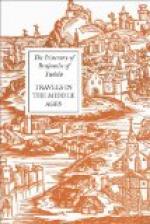[Footnote 29: Professor Ray Lankester, in a lecture given on Dec. 29, 1903, at the Royal Institution, illustrated changes in the disposition of land and water by pointing to the identical ruined Temple referred to by Benjamin. It now stands high above the sea, and did so in the second and third centuries of the present era, but in the eighth and ninth centuries was so low, owing to the sinking of the land, that the lower parts of its marble pillars stood in the sea, and sea-shells grew in the crevices.]
[Footnote 30: Josippon gives these legends in Book I, chaps. iii and iv, when speaking of Zur, whom he associates with Sorrento. Benjamin had few other sources of information. In the immediate neighbourhood of Pozzuoli is Solfatara, where sulphur is found. A destructive eruption from the crater took place in 1198. Hot springs abound, and the baths at Bagnoli are much frequented to the present day. The underground road is the Piedi grotta of Posilipo, constructed by Augustus.]
[Footnote 31: R. Isaac, the father of R. Judah, must be the “Greek Locust” against whom Ibn Ezra directed his satire when visiting Salerno some twenty years before R. Benjamin. See Graetz, VI, p. 441.]
[Footnote 32: Cf. Isaiah lxvi. 19.]
[Footnote 33: This city was destroyed by William the Bad in 1156. It was ordered to be restored by William the Good in 1169, so that Benjamin must have visited Bari before that date. See p. 79, note 2. We have here another clue as to the date of Benjamin’s travels.]
[Footnote 34: See H.M. Adler’s article on Jews in Southern Italy, J.Q.R., XIV, p. 111. Gibbon, Decline and Fall of the Roman Empire, chap. lvi, describing the reconquest of the southern provinces of Italy by the Byzantine Emperor Manuel, 1155, says. “The natives of Calabria were still attached to the Greek language and worship.”]
[Footnote 35: The
river Achelous falls into the Ionian Sea
opposite to Ithaca.]
[Footnote 36: Anatolica is now known as Aetolicum.]
[Footnote 37: Patras, the ancient Patrae, was founded long before the time of Antipater. Josippon, II, chap. xxiii, is again the questionable authority on which Benjamin relied.]
[Footnote 38: Lepanto
in the early Middle Ages was called
Naupactus or Epacto,
and to reach it from Patras the Gulf of
Corinth had to be crossed.]
[Footnote 39: Chalcis,
the capital of Euboea or Negroponte,
is even now called Egripo.
It is situated on the Straits of
Euripus.]
[Footnote 40: Some
twenty years later the Wallachians were
in open revolt and became
independent of the Byzantine
Empire. Gibbon,
chap. lx.]
[Footnote 41: See
Gibbon, chap. liii. He often quotes
Benjamin.]




